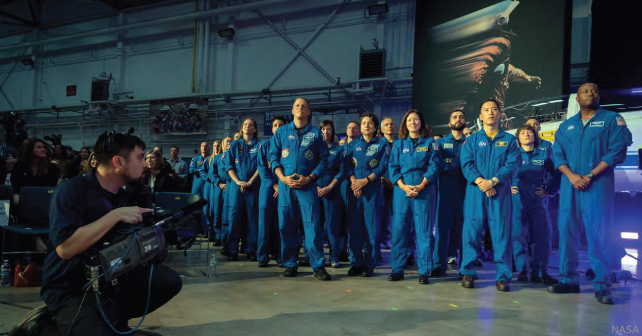
Space medicine may not really be the final frontier—after all, we are always learning to push the boundaries of medicine and human capability—but it does provide a whole new field of study, a subspecialty whose intricacies and innovations will have ramifications on Earth as well as among the stars.
Explore This Issue
ACEP Now: Vol 42 – No 05 – May 2023“We’re at an inflection point in space medicine with our needs and demands changing,” Dr. Lehnhardt muses. “The next 10 to 20 years will see a rapid growth in space travel, which makes this an exciting time to be in space medicine.”

Dr. Sophia Gorgens
Dr. Görgens is part of the Zucker Emergency Medicine Residency at North Shore University Hospital and Long Island Jewish Medical Center. Her work has been published in the Journal of the American Medical Association and Annals of Emergency Medicine, and she is the newest guest resident editor for the AMA Journal of Ethics.

NASA’s international astronaut corps awaits the announcement of the four crewmembers of the Artemis II crew that will travel around the Moon during a Monday, April 3, 2023, crew announcement news conference at Ellington Field near NASA’s Johnson Space Center. (Click to enlarge.)
Pages: 1 2 3 4 | Single Page




2 Responses to “Space Medicine: Emergency Physicians Voyage Into the Final Frontier”
July 14, 2023
Aerospace medicine academicians.10 minutes lost in eternity reading this shallow writing project by an ER resident. Not a single source from experienced space medicine physicians, nor a contrast from medical associations producing knowledge about human space exploration, not even a hint of research about basic space physiology. The delusional scenario of an astronaut with cholecystitis should have been enough warning. Expect major backlashes from accredited organizations, educational programs and think-tanks once they endure reading this dystopian review.
August 28, 2023
Terence Alost, MD MBA FAAEMOk, I read the reply above, I have been teaching science since the 80s and Emergency Medicine since the 90s (and I grew up on the Space Coast during the 70s and worked testing parts of the Shuttle in the 80s.) So, is the article extremely rigorous in its scientific value or rigor? No, but so what! It is sort of, science fiction or just an article, but SO WHAT! If the article sparks the interest of a young physician or physician-to-be to work in that field, then that’s a fantastic thing. Those of us older than 45, 50, 55, 60 etc. “know” that we are smarter than our childish 28 t0 32-year-old colleagues! I’m old< I guess. (Unless you're dumb or they are exceptionally smart, that is true.) It, however, is NOT ABOUT WHO IS SMARTER! It is about who is more experienced. It is not important to brag about experience. It is a DUTY to pass that experience on to the next generation. And it will be their exact job 20 to 30 years later.
So, to the author of the last criticism, I get it. Scientifically speaking, perhaps the article is goofy. But if that article sparks the interest of a 15-year-old somewhere, maybe they will do something incredible 30-40 years from now. I don't know your age. I am quite healthy (currently) and might still be alive at age 100+ or I could be gone. However, all of us need to work to make medicine and the world better for the times after we are gone.